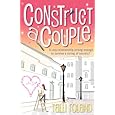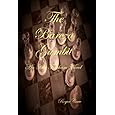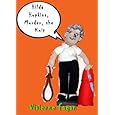How do you strike the balance between writing something
you want to write and writing something that people want to read, in terms of
the compromises you make, if any?
No compromises. I write the sort of book I want to read,
knowing many readers share my taste. If a publisher wanted me to add graphic
sex and violence to Replica to make
it a standard thriller, and offered me a six figure sum, I’d decline.
Haughtily.
What excites, attracts or appeals to you about the genres
you write in?
Gah! Don’t mention genres – I have an aversion to
pigeon-holes. My novels are hybrid. Some of my strangest reviews are from
readers who assume they are pure chicklit, romance, thriller, or mystery, and judge them on those terms. I like
twists and surprises and humour, and all my novels have a romance in them.
Literary fiction, ‘beautiful’ writing, leaves me cold.
Do you have a box, drawer, folder etc. where you keep
thoughts and ideas for future stories?
I have a pile of scrap A5 paper with gnomic sentences on,
sometimes scrawled in the middle of the night. I write everything down, or I
forget. You never know when inspiration will strike, or what you will overhear.
I once cycled past a man and his Labrador. He was saying earnestly to the dog,
“Now it’s no good you sulking…”
Each book I write has its own separate document of notes,
where I put ideas, lists, character biographies and bits I’ve cut. Also a
picture file; photographs of people, places, maps and plans.
How do you manage plot bunnies (ideas that invade your mind
that aren’t usually helpful to the story you’re writing but breed
like...er...bunnies)?
Plot bunnies? I don’t get those. I want some!
How much of you is in your characters? Which of your
characters is the you that you’d most like to be?
There’s a bit of me in most of my characters, and the weird
thing is, they then influence me. It’s as though writing them makes me
acknowledge a hidden part of my psyche. I’ve become more assertive and
outspoken since writing fiction, as if my characters showed me different ways
of handling life. On a more trivial level, I hardly swore till I wrote Ric
Kealey and Jeff Pike.
If I had to be one of my characters, it’d be Caz Tallis, Remix’s
narrator. She has a pretty good life – interesting job restoring rocking
horses, gorgeous boyfriend, trusty best friend who is in love with her, and
she’s happy.
Do you become so wrapped up in your writing that your
spouse wonders if they're married to you or one of your characters?
I am spouseless, but when she lived at home the offspring
used to do a lot of eye-rolling and at one point banned all mention of my
books. So yes, I do get obsessed.
What type of book do you like reading? Is it the same
genre as you write?
Genres again… I like an absorbing read with a satisfying
(not necessarily happy) end, humour and believable characters. My two favourite
authors I reread are Jane Austen and Mary Renault. I am no longer prepared to
finish a book that’s hard going. All the best books are easy reads.
What lengths do you go to to convince us readers that
your book has the X factor?
I research, I rewrite to make the read as smooth as
possible, and revise in the light of beta readers’ comments. My daughter reads
as I go along and tells me if she thinks the story is heading in the wrong direction.
She is generally right. She also updates slang as necessary. I am fond of
advice, though feel no obligation to take it, and am always ready to seize on
suggested improvements.
How do you feel when a reader points out the spelling
mistake(s) you have made?
Mortified. I have to correct it instantly, NOW! I take pride
in my writing being typo-free, and am a good proof reader. I’ve learned always to check brand names, as
they are easy to get wrong.
What do you like most about visiting KUF/forums?
I like the friendly ethos, something that is alarmingly
absent from some forums I have been on, and the other Kuffers. And I like the
design of the site. Lou is a gent.
What is on your near horizon?
I am a third of the way through the WIP, currently called Ice
Diaries. It’s set in a post-pandemic 2018, in a London covered by twenty
metres of snow. My heroine, Tory, lives among a small group of survivors, the
sort of people you’d meet at an Islington dinner party. One night she finds a
man face down in the snow who has a disruptive effect on her little community…
Where can we find you for more information?
My website, blog, and Amazon
Author Page. I always answer readers’ emails, and am still fretting about
one who mistyped her email address so I couldn’t reply.














